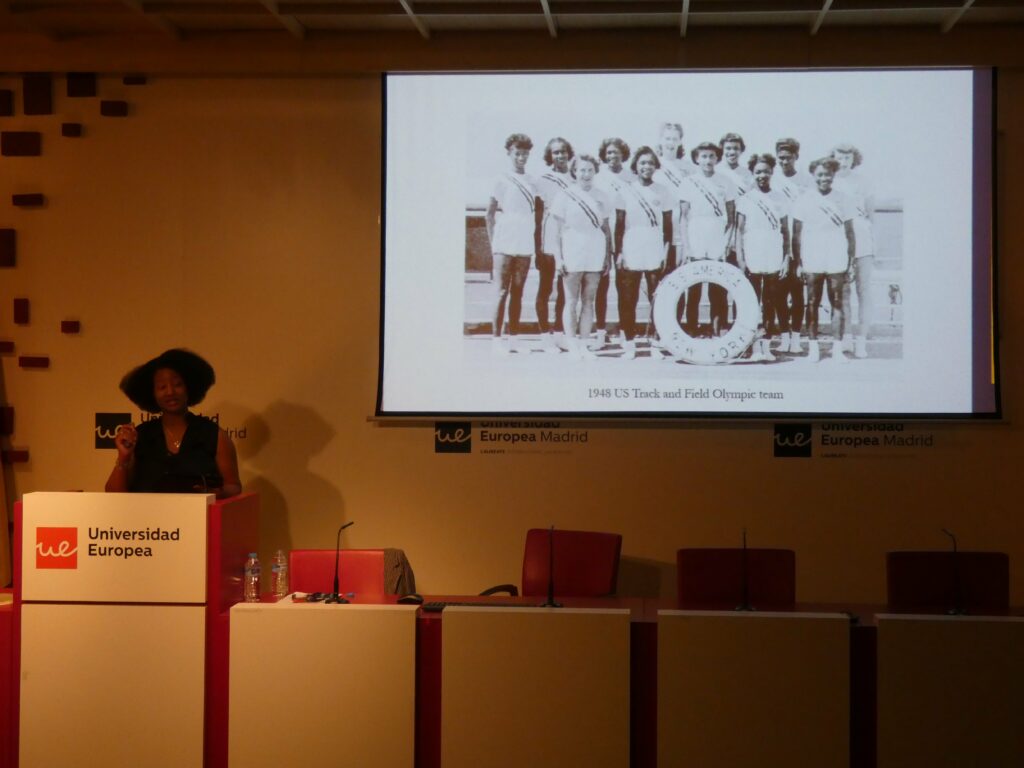Early Career Scholars Lukas Rehmann (Germany) and Lisas Taylor (Great Britain) were awarded the Routledge Presentation Award at the 2019 Congress in Madrid.
Lukas studied history and sport science at the University of Münster (Germany). Since 2015 he has held an academic position at the Institute of Sport Sciences, Department of Sport Pedagogy and Sport History, at the University of Münster. This position is connected to a research project on the history of sport medicine in Germany lead by Prof. Dr. Michael Krüger, including Lukas’ PhD dissertation, “The history of sport medicine in the GDR”. He has already published multiple book chapters on this topic.
Lisa is in the third year of her PhD studies, funded by the Arts & Humanities Research Council as a Collaborative Doctoral Partnership between Manchester Metropolitan University (Great Britain) and the River & Rowing Museum, Henley on Thames. Her PhD uses oral history and archival research to explore women’s rowing in Britain since 1945, and she is fascinated by how individual life courses and narratives can be explored and shared in sport history. Prior to her PhD, Lisa worked in rowing for several years, including two years with the national governing body (British Rowing). Her MA dissertation focused on the impact of talent identification on performance pathways within women’s rowing. She is currently the Assistant Book Reviews Editor for Sport in History.
Lukas Rehmann, University of Münster, Germany
Spies in tracksuits: Sport espionage during the Cold War
The Cold War epoch was marked by the antagonistic relationship between two socio-economic and political systems as well as the clash of irreconcilable geopolitical interests. It appeared as a confrontation between capitalism and communism and determined foreign as well as security policy worldwide in the second half of the 20th century. For decades, political, economic, technical and military efforts were made on both sides of the Iron Curtain to contain the influence of the opposing camp. In this constellation, secret services became more and more important as part of the “nerves of government.” Intelligence actions such as espionage, covert operations, targeted disinformation and propaganda, sabotage, hostage-taking and even murder of unpopular individuals marked the Cold War between both the superpowers and their allies. Furthermore, the East-West conflict shaped all areas of life, economy, culture, society and especially sport. Governments realized sport and physical culture’s political potential. International sports competitions, world championships and Olympic Games became areas where the rival powers could prove or assert their dominance. Western countries and Soviet bloc nations invested heavily in sports training and development, particularly in sports involving international competition. This inevitably led to a scientification of sport, to the rise of sports medicine but also to the spread of doping practices. Against this background this research traces the sport espionage during the Cold War. Focusing on the divided post-war Germany as the focal point of the East-West conflict, intelligence actions of both German states against each other will be investigated and compared. Particular attention will be dedicated to motives and institutional structures as well as to actors and practices. Relevant and previously unpublished documents from the archives of the German secret services form the basis of this study.
Lisa Taylor, Manchester Metropolitan University, Great Britain
Home Advantage: The 1960 European Women’s Rowing Championships at Willesden
This paper addresses a milestone in the history of British sport, namely the hosting of the 1960 European Women’s Rowing Championships at the Welsh Harp reservoir in Willesden, London. It explores the significance of this event to male and female amateur rowing communities in Britain at the time – communities that were still administratively (and, to a significant degree, practically) independent in 1960, and has three key objectives. Firstly, using archival materials from the River & Rowing Museum, British Rowing headquarters, newspaper archives and personal collections held by former athletes, it locates the event in sporting and social context. Secondly, it explores the remembered experience of the championships using oral history interviews with three women who competed for Great Britain at the event, and considers the content of these interviews alongside the methodological implications of their interactions with the written record. Lastly, using this research as a foundation, the paper examines how the different objectives of the Amateur Rowing Association (ARA), the Women’s Amateur Rowing Association (WARA) and the British athletes were realised or diminished through the hosting of the event. It will argue that the event was, administratively, a success, despite relatively poor results on the water for the British team. Hosting the event served political purposes for the ARA and the WARA: in addition to building Britain’s profile in international rowing, it increased the perceived relevance and value of the women’s sport in the broader context of amateur rowing in Britain. The amalgamation of the WARA into the ARA was agreed just two years later, and the paper argues that more progressive factions of the ARA saw building an understanding of this relevance and value as a necessary precursor to greater integration of men’s and women’s rowing. Yet it will also suggest that individual experiences of the event were more equivocal than published accounts, and that the political manoeuvrings behind it are suggestive of patriarchal as well as progressive impulses.

Lukas Rehmann and ISHPES President Annette Hofmann

Lisa Taylor presenting her paper

